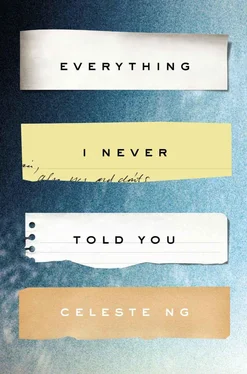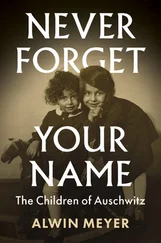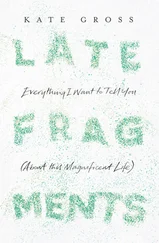James felt he should return this privilege, this private gift. He had mentioned once, in passing, that his parents had worked at a school, leaving it at that, hoping she’d think teacher. But he had never told her how the school kitchen had been like the land of the giants, everything economy-sized: rolls of tinfoil half a mile long, jars of mayonnaise big enough to hold his head. His mother was in charge of bringing the world down to scale, chopping melons into dice-sized cubes, portioning pats of butter onto saucers to accompany each roll. He had never told anyone how the other kitchen ladies snickered at his mother for wrapping up the leftover food instead of throwing it away; how at home they’d reheat it in the oven while his parents quizzed him: What did you do in geography? What did you do in math? And he’d recite: Montgomery is the capital of Alabama. Prime numbers have only two factors. They didn’t understand his answers, but they’d nodded, pleased that James was learning things they did not know. As they spoke, he would crumble crackers into a cup of celery soup, or peel waxed paper from a wedge of cheese sandwich, and pause, confused, certain he’d done this before, uncertain whether he was reviewing his studies or the whole schoolday. In the fifth grade, he had stopped speaking Chinese to his parents, afraid of tinting his English with an accent; long before that, he had stopped speaking to his parents at school at all. He was afraid to tell Marilyn these things, afraid that once he admitted them, she would see him as he had always seen himself: a scrawny outcast, feeding on scraps, reciting his lines and trying to pass. An imposter. He was afraid she would never see him any other way.
“My parents are both dead,” he said. “They died just after I started college.”
His mother had died his second year, a tumor blossoming in her brain. His father had gone six months later. Complications of pneumonia, the doctors had said, but James had known the truth: his father simply hadn’t wanted to live alone.
Marilyn didn’t say anything, but she reached out and cupped his face in her hands, and James felt the leftover heat from the oven in her soft palms. They were there only a moment before the timer buzzed and she turned back to the stove, but they warmed him through. He remembered his mother’s hands — scarred from steam burns, callused from scouring pots — and wanted to press his lips to the tender hollow where Marilyn’s life line and love line crossed. He promised himself he would never let those hands harden. As Marilyn took the chicken, burnished and bronze, from the oven, he was mesmerized by her deftness. It was beautiful, the way broth thickened to gravy under her guidance, how potatoes fluffed like cotton beneath her fork. This was the closest thing he’d seen to magic. A few months later, when they married, they would make a pact: to let the past drift away, to stop asking questions, to look forward from then on, never back.
That spring, Marilyn was making plans for her senior year; James was finishing his Ph.D. and waiting, still, to see if he would be taken on in the history department. There was an opening and he had applied, and Professor Carlson, the department head, had hinted he was by far the most accomplished in his class. Now and then, he would interview for positions elsewhere — in New Haven, in Providence — just in case. Deep inside, though, he was certain that he would be hired at Harvard. “Carlson as good as told me I’m in,” he said to Marilyn whenever the subject came up. Marilyn nodded and kissed him and refused to think about what would happen when she graduated the next year, when she headed off to medical school who knew where. Harvard, she thought, ticking off her fingers. Columbia. Johns Hopkins. Stanford. Each digit a step farther away.
Then, in April, two things neither of them expected: Professor Carlson informed James that he was very, very sorry to disappoint him, but they had decided to take his classmate William McPherson instead, and of course they knew James would find many other opportunities elsewhere. “Did they say why?” Marilyn asked, and James replied, “I wasn’t the right fit for the department, they said,” and she did not raise the subject again. Four days later, an even bigger surprise: Marilyn was pregnant.
So instead of Harvard, an offer at last from humble Middlewood College, accepted with relief. Instead of Boston, small-town Ohio. Instead of medical school, a wedding. Nothing quite as planned.
“A baby,” Marilyn said to James, over and over. “Our baby. So much better.” By the time they were married, Marilyn would be only three months along, and it wouldn’t show. To herself, she said, You can come back and finish that last year, when the baby is older. It would be almost eight years before school would seem real and possible and tangible again, but Marilyn didn’t know that. As she left the dean’s office, an indefinite leave secured, she was certain that everything she had dreamed for herself — medical school, doctorhood, that new and important life — sat poised for her return, like a well-trained dog awaiting its master. Still, when Marilyn sat down at the telephone table in the dorm lobby and gave the long-distance operator her mother’s number, her voice shook with each digit. As her mother’s voice finally came over the line, she forgot to say hello. Instead she blurted out, “I’m getting married. In June.”
Her mother paused. “Who is he?”
“His name is James Lee.”
“A student?”
Marilyn’s face warmed. “He’s just finishing his Ph.D. In American history.” She hesitated and decided on a half-truth. “Harvard was thinking of hiring him, in the fall.”
“So he’s a professor.” A sudden alertness tinted her mother’s voice. “Sweetheart, I’m so happy for you. I can’t wait to meet him.”
Relief flooded Marilyn. Her mother wasn’t upset about her leaving school early; why would she mind? Hadn’t she done just what her mother had hoped: met a wonderful Harvard man? She read off the information from a slip of paper: Friday, June 13, eleven thirty, with the justice of the peace; lunch afterward at the Parker House. “It won’t be a big party. Just us, and you, and a few of our friends. James’s parents are both dead.”
“Lee,” her mother mused. “Is he connected to anyone we know?”
Marilyn realized, suddenly, what her mother was imagining. It was 1958; in Virginia, in half the country, their wedding would break the law. Even in Boston, she sometimes saw disapproval in the eyes of the passersby. Her hair was no longer the white-blond of her childhood, but it was still light enough to catch attention when bent toward James’s inky black head in movie theaters, on a park bench, at the counter at the Waldorf Cafeteria. A gaggle of Radcliffe girls came down the stairs, one hovering nearby to wait for the phone, the others crowding around the hall mirror to apply powder to their noses. One of them, just a week before, had heard about Marilyn’s marriage and came by her room “to see if it was really true.”
Marilyn squeezed the receiver and pressed one palm to her belly and kept her voice sweet. “I don’t know, Mother,” she said. “Why don’t you ask him when you meet him?”
So her mother came in from Virginia, the first time she’d ever left the state. Standing at the station with James hours after his graduation, waiting for her mother’s train, Marilyn told herself: she would have come anyway, even if I’d told her. Her mother stepped onto the platform and spotted Marilyn and a smile flashed across her face — spontaneous, proud — and for that instant, Marilyn believed it completely. Of course she would have. Then the smile flickered just for a moment, like a flash of static. Her gaze darted back and forth between the stout blond woman standing on her daughter’s left and the skinny Oriental man on her right, looking for the advertised James, not finding him. Finally understanding. A few seconds passed before she shook James’s hand, told him she was very, very happy to meet him, and allowed him to take her bag.
Читать дальше












